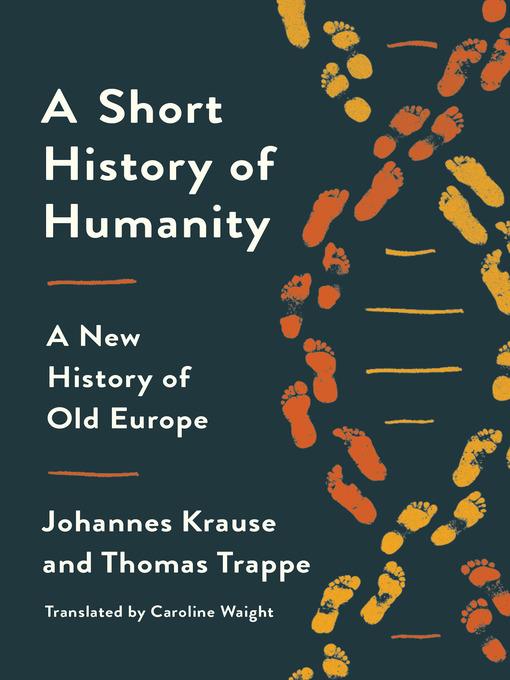
A Short History of Humanity
A New History of Old Europe
کتاب های مرتبط
- اطلاعات
- نقد و بررسی
- دیدگاه کاربران
نقد و بررسی

January 25, 2021
Krause, director of the Max Planck Institute for Evolutionary Anthropology, and journalist Trappe track the genetic history of Europe in this fascinating exploration of early human migration and humankind’s millennia-long struggle with deadly pathogens. They begin with Krause’s 2010 discovery—by way of a finger bone found in a Siberian cave—of a group of archaic humans independent from Neanderthals. From there, the authors detail the various migrations that followed this genetic split half a million years ago; the warming temperatures that led to the rise of farming in Anatolia at the beginning of the Holocene period nearly 12,000 years ago; and the takeover of Europe by horse-riding steppe peoples about 4,000 years ago. With DNA analysis and other modern scientific methods, the authors note, researchers can piece together the past by tracking the spread of diseases such as bubonic plague and syphilis during human migrations. Krause and Trappe make complicated scientific processes accessible to lay leaders, and offer hope that the ongoing study of ancient genetics and the development of new technologies such as genome editing will help to fight pathogens including Covid-19. The result is a captivating and informative look at the origins and future of humanity.

February 15, 2021
A lucid overview of European prehistory. "Bones and stones" once dominated archaeology, but advances in genetics have produced new information and settled old arguments about human evolution, relationships, and migrations. Krause, the director of the Max Planck Institute for Evolutionary Biology, and journalist Trappe write that the young field of archaeogenetics enables scientists to "read skeleton fragments and identify connections that would have been unknown even to the people to whom the bones belonged." By the end of the 20th century, anthropologists knew that ancient hominids had left Africa and spread across the old world. Modern Homo sapiens did the same more than once, arriving permanently in Europe 40,000 years ago. There, they encountered the closely related Neanderthals, who soon died off or were absorbed, leaving us a sprinkling of their genes. A series of ice ages made life difficult until the current warm spell began 12,000 years ago. Modern European DNA contains genes from the hunter-gatherers who thrived until they were marginalized 8,000 years ago by a mass migration of farmers from Anatolia (modern Turkey), which had undergone the agricultural revolution. Completing the modern European genome required another mass migration of pastoralists from the Russian steppes 4,800 years ago. Near the halfway point of the book, the authors pivot from the genetics of our ancestors to their diseases. Hunter-gatherers were too scattered to support epidemics, which began when humans began to live close to one another and their animals, the source of most modern-day epidemics. Readers may be surprised to learn that scientists were only able to offer guesses about the cause of the 14th-century Black Death and earlier plagues--until 2011, when they decoded the genome of the bubonic plague bacillus. Leprosy also terrorized our ancestors but retreated, replaced by tuberculosis, a closely related bacillus, which became the leading killer until the 20th century. The authors conclude their tight yet wide-ranging survey with a discussion of how science does not support any claims of racial supremacy. An impressive update on human evolution.
COPYRIGHT(2021) Kirkus Reviews, ALL RIGHTS RESERVED.

Starred review from April 1, 2021
Krause (archaeogenetics, Max Planck Inst.), who helped discover the ancient Denisova hominins in Russia, and journalist Trappe have written a splendid account of human origins, migrations, and pathogens from the perspective of recent DNA evidence. The book's scope is immense. It begins hundreds of thousands of years ago, mapping the migrations of Pleistocene humans, including Neanderthals and the newly discovered Denisovans of the Russian steppes. The book then goes into the origins of civilization, aligning DNA evidence with the spread of Indo-European languages from ancient Iran. The second part of the book focuses on the origins of human diseases--particularly relevant in the COVID-19 era. Readers will find new information, such as the occurrence of plague in Stone Age societies. Krause has firsthand knowledge of this evidence, having performed some of the leading laboratory research in the genetics of human prehistory. Co-author Trappe uses easily understandable language to describe subjects that might otherwise be overly technical or scientific. What makes this book unique among other world histories is its focus on evidence newly acquired from DNA matter, which provides new avenues of understanding the human past. VERDICT Scientific yet accessible, this original book offers much insight to readers of European history.--Jeffrey Meyer, Iowa Wesleyan Univ.
Copyright 2021 Library Journal, LLC Used with permission.

























دیدگاه کاربران